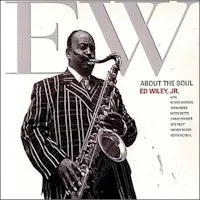Year: 2023
File: MP3@320K/s
Time: 56:42
Size: 131,0 MB
Art: Front
(5:58) 1. Edges
(3:38) 2. Baubles, Bangles, And Beads
(5:52) 3. Stand Up!
(4:14) 4. Time To Shine
(6:22) 5. Groundwork
(4:31) 6. Healing The Heart
(3:48) 7. Don't Blame Me
(5:39) 8. The Manhattaners
(3:26) 9. My Way
(6:10) 10. Rocks, Lime
(6:58) 11. Cupbearers
Veteran trombonist, educator and bandleader Robert Edwards is a fixture of New York City jazz scene, performing in many of the jazz venues in the city and, as of this writing, becoming the newest member of the famed Vanguard Jazz Orchestra. Edwards fronts a marvelous quintet that has been performing regularly at Smalls Jazz Club for many years now. Up Swing celebrates the post-bop sounds the group is known for and covers many of the ensemble's "greatest hits from over the years."
Joining the leader on his fifth recording to date is a star-studded group of players including trumpeter Joe Magnarelli, pianist Adam Birnbaum, bassist Mike Karn and drummer Aaron Kimmel. Singer Vanessa Perea provides her luscious vocals on the Jimmy McHugh and Dorothy Fields standard "Don't Blame Me," the only vocal tune of the session and one of five covers in an eleven-piece repertoire that features six originals.
Opening up the music is the Edwards original "Edges," a sprawling up-tempo bebop-dominant number quickly establishing the exciting sounds one is in for throughout this album with the trombonist featured prominently. The Robert Wright classic "Baubles, Bangles and Beads," a favorite of the leader, takes off with some splendid solo moments from Magnarelli accompanying the trombonist on a delicious and fresh treatment of an old beautiful standard. The leader's original "Stand Up!" is all Edwards making that trombone sing and dance all over the place, a blues-styled tune and tip of the hat to pianist Horace Silver with pianist Birnbaum weighing in on Silver-like solos of his own.
The leader does some quick work on Cedar Walton's "Groundwork" followed by Magnarelli the pianist and drummer Kimmel all delivering aggressive solos on another outstanding interpretation of a terrific jazz number. The band steps back and plays it warm and mellow on the session's soft spot, "Healing the Heart," featuring bassist Karn on light fingerplay on a beautiful light tune worth repeated spins.
The classic pop tune "My Way," made famous by Frank Sinatra, sounds splendid here with Edwards doing things on the trombone his way, while his last original, "Rocks, Lime," a "shuffle that harkens the sound of Art Blakey and the Jazz Messengers." The album closes with "Cupbearers," a tune that has served as the band's opening number for many years, a burner for sure whether in the beginning or the end.
There's truly no downside to the remarkable Up Swing, as trombonist Robert Edwards crafts an album that appeals to everyone but, in particular, to jazz audiences that prefer the straight-ahead, bebop-infused style of jazz that remains so popular today. To swing is the thing and this album does it well. By Edward Blanco https://www.allaboutjazz.com/up-swing-robert-edwards-self-produced
Personnel:Robert Edwards – Trombone; Joe Magnarelli – Trumpet; Adam Birnbaum – Piano; Mike Karn – Bass; Aaron Kimmel – Drums; Vanessa Perea – Vocals
Joining the leader on his fifth recording to date is a star-studded group of players including trumpeter Joe Magnarelli, pianist Adam Birnbaum, bassist Mike Karn and drummer Aaron Kimmel. Singer Vanessa Perea provides her luscious vocals on the Jimmy McHugh and Dorothy Fields standard "Don't Blame Me," the only vocal tune of the session and one of five covers in an eleven-piece repertoire that features six originals.
Opening up the music is the Edwards original "Edges," a sprawling up-tempo bebop-dominant number quickly establishing the exciting sounds one is in for throughout this album with the trombonist featured prominently. The Robert Wright classic "Baubles, Bangles and Beads," a favorite of the leader, takes off with some splendid solo moments from Magnarelli accompanying the trombonist on a delicious and fresh treatment of an old beautiful standard. The leader's original "Stand Up!" is all Edwards making that trombone sing and dance all over the place, a blues-styled tune and tip of the hat to pianist Horace Silver with pianist Birnbaum weighing in on Silver-like solos of his own.
The leader does some quick work on Cedar Walton's "Groundwork" followed by Magnarelli the pianist and drummer Kimmel all delivering aggressive solos on another outstanding interpretation of a terrific jazz number. The band steps back and plays it warm and mellow on the session's soft spot, "Healing the Heart," featuring bassist Karn on light fingerplay on a beautiful light tune worth repeated spins.
The classic pop tune "My Way," made famous by Frank Sinatra, sounds splendid here with Edwards doing things on the trombone his way, while his last original, "Rocks, Lime," a "shuffle that harkens the sound of Art Blakey and the Jazz Messengers." The album closes with "Cupbearers," a tune that has served as the band's opening number for many years, a burner for sure whether in the beginning or the end.
There's truly no downside to the remarkable Up Swing, as trombonist Robert Edwards crafts an album that appeals to everyone but, in particular, to jazz audiences that prefer the straight-ahead, bebop-infused style of jazz that remains so popular today. To swing is the thing and this album does it well. By Edward Blanco https://www.allaboutjazz.com/up-swing-robert-edwards-self-produced
Personnel:Robert Edwards – Trombone; Joe Magnarelli – Trumpet; Adam Birnbaum – Piano; Mike Karn – Bass; Aaron Kimmel – Drums; Vanessa Perea – Vocals
Upswing




















